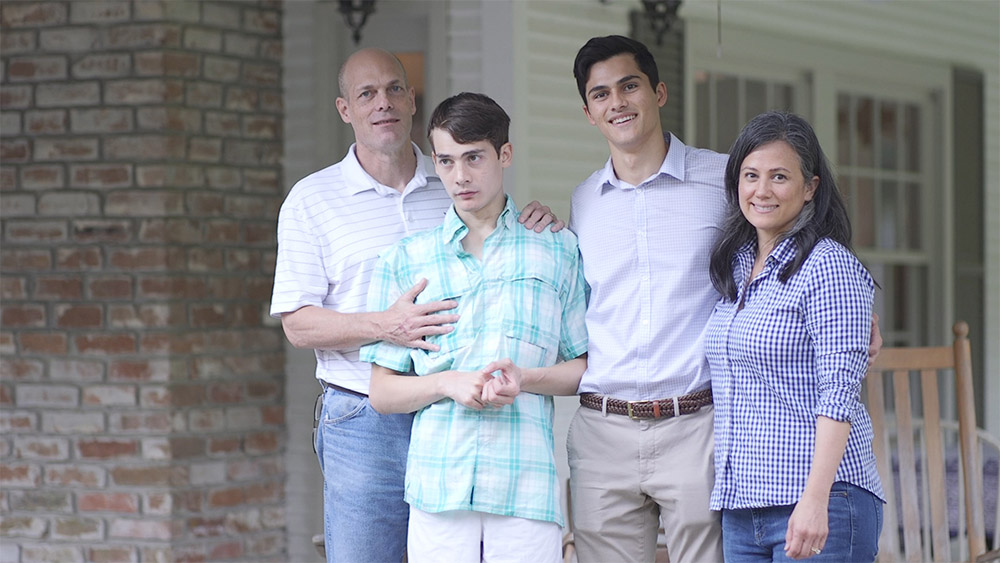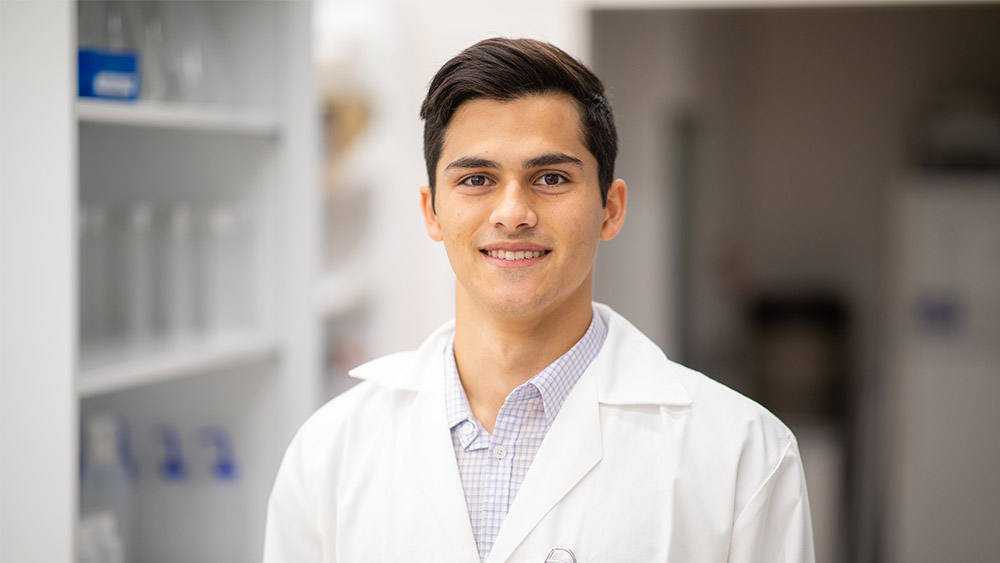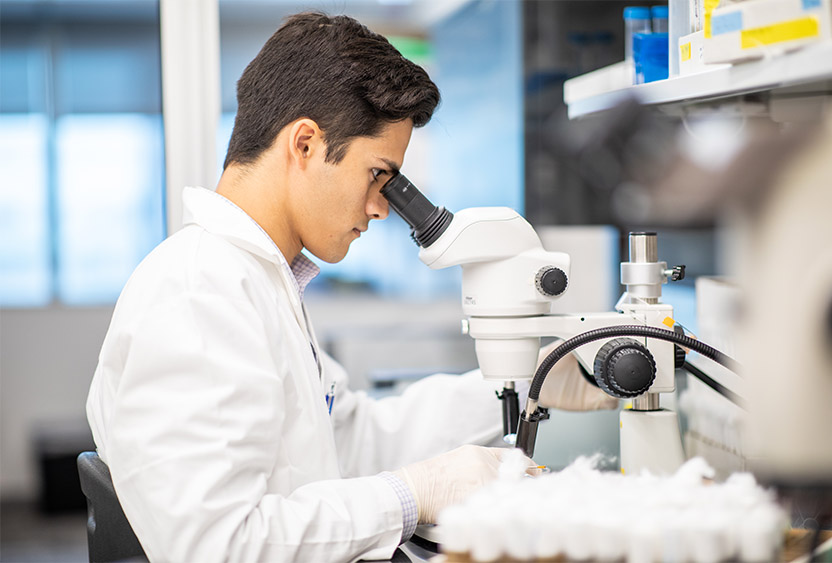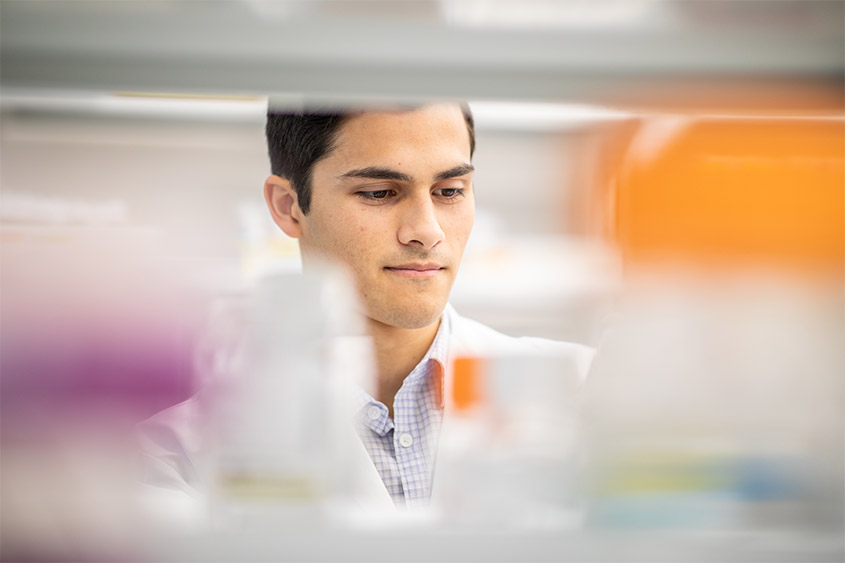Nathan Bliss sits on the porch swing of his parents’ Houston home with his arm around his older brother Charles. It’s like a scene carved out of a Norman Rockwell painting. There’s an American flag waving in the distance and their golden retriever Princess is playing in the yard. As they rock, Nathan speaks calmly to Charles, convincing him to stay on the swing.
Charles has a rare genetic condition called Phalen-McDermid Syndrome, and as a result, has a severe developmental disability, epilepsy, limited mobility and speech, among other symptoms.

Like many other families who have a loved one with a disability, each member of the Bliss family has learned to fill the role of caretaker. And they do so, seemingly, with ease. For Nathan, his brother’s condition has inspired him to study biomedical engineering at Texas A&M University, where he is now a sophomore. Someday he hopes to also go to medical school with a goal of becoming a physician-scientist.
“That’s the field I’ve wanted to go into for a long time,” he said. “I’ve been immersed in this environment — doctors, researchers and family members who have been trying to help my brother. That’s what inspired me to want to pursue this career.”

A passion for research
When Nathan was in high school, his mother met a neuroscience physician-scientist at a luncheon. Dr. Hsiao-Tuan Chao, assistant professor in pediatrics, molecular and human genetics, and neuroscience at Baylor College of Medicine, runs a lab located in the Jan and Dan Duncan Neurological Research Institute at Texas Children’s Hospital where she and her team study neurodevelopmental disorders. Chao invited Nathan to participate in some basic experimentation as a high school student, and he readily agreed.
“Despite his youth, Nathan already exhibited an unparalleled level of maturity and scientific body of knowledge,” Chao said. “In fact, many people remarked on the superb ‘medical resident’ working with me, as Nathan readily impressed our colleagues with his professionalism, poise and intellect.”
Three years later he’s still working in her lab, and this past summer he earned a grant from the Autism Science Foundation, one of only four awarded this year, to continue the research in a more hands-on way. By conducting research on fruit flies, they hope to be able to help doctors diagnose rare diseases sooner so that patients can receive the treatment they need early in life. Nathan hopes to someday play a role in finding a cure for rare diseases like Phalen-McDermid Syndrome.

Walking in his brother's shoes
In many ways, Nathan’s childhood was different than that of his peers. His brother was in and out of the hospital, sometimes spending months away at a time.
“It was challenging to see him struggle,” Nathan said. “But it’s made me more responsible. The biggest thing it’s done is it’s given me this sense of compassion.”
Nathan said his brother has taught him to always think of others’ needs.
In our family, so much of his family life was defined by his big brother’s disability, and it really took everybody chipping in and rolling up their sleeves and always doing their best in order for us to survive as a family. And I think that as a natural output of that, Nathan is a very resilient kid. He’s resourceful and he’s compassionate, and those are all traits that I think he actually has his brother to thank for.

“He’s not verbal anymore,” Nathan said. “You don’t know what it is he wants, or what he’s thinking. You have to put yourself in his shoes and think, ‘Does he need to use the restroom?’”
His personal experiences and compassion drive him in his research, and that’s something that Chao finds very valuable in the lab.
“Nathan’s personal experiences and unique insights very much were integral in highlighting to our lab and colleagues how basic science endeavors can have the potential to positively impact the lives of those affected by rare diseases,” Chao said. “I have no doubt that he will make a significant impact to the field of biomedical research and clinical medicine.”
Nathan is also motivated by his mother Geraldine.
“My mom served as chair of the research committee for the Phelan-McDermid SyndromeFoundation,” he said. “She’s been my biggest inspiration. She took this small foundation and made a big presence in the community of rare disease. I hope to one day make an impact like her.”
Geraldine said she’s very proud of Nathan for working hard and applying his knowledge and creativity to help others.
“In our family, so much of his family life was defined by his big brother’s disability, and it really took everybody chipping in and rolling up their sleeves and always doing their best in order for us to survive as a family,” she said.
As a result, Nathan became a resilient man.
“He’s resourceful and he’s compassionate,” she said. “And those are all traits that I think he actually has his brother to thank for.”